- Home
- William Ritter
Jackaby Page 7
Jackaby Read online
Page 7
“I see why Swift was so angry about it being right under his nose! It wasn’t just a murder in his city—he let his personal newsman get killed before his free publicity even hit the stands.”
“Yes, well, it seems Mr. Bragg had been looking into something else as well.”
Jackaby reached the end of the hallway and gave the door to his laboratory a shove. It squeaked open, and he pushed past whatever had been blocking it, sending several ripe red apples rolling across the carpet.
“Oh, blast, it’s overflowing again,” he muttered, ducking absently under the skeletal alligator as he plowed in. “Mind your step. Help yourself to an apple if you like.”
I remained in the doorway. A heavy black cauldron sat on the other side of the door, teeming with fresh fruit. I hadn’t had a proper meal since yesterday, but something about the room’s lingering smell of burnt hair and unknown chemicals quashed my appetite.
Jackaby crossed the room and pulled off his coat, draping it casually over the mannequin. From its pockets, he pulled out a few of the vials I had seen earlier and nestled them into waiting slots on the big metal rack. He continued, selectively removing items, like the slim vials I had seen him peering through, and replacing them with new ones. New artifacts found their way into the myriad pockets as he darted about, among them a Chinese coin, a set of rosary beads, and a little vial with something that rattled inside it. I gave up following his movements as he restocked.
Without the coat, the man looked even lankier. He seemed to be built entirely of angles, from his long legs to his hard cheekbones. He wore a simple, clean white shirt with no necktie, and a pair of plain brown suspenders. His wild hair looked coal black in the dim light of the room, and atop his gaunt frame it gave him the figure of a spent match.
“What else was Bragg onto?” I asked.
“I don’t know yet. But I believe the answer may lie in this.” He produced a folded piece of paper and handed it to me. “I found it concealed beneath the leather blotter on his desk. Tell me what you make of it.” I opened it and turned it around.
“It’s a map,” I said.
“Brilliant. Already making yourself an invaluable asset to the organization.”
I went on. “It’s not a proper, printed map. It looks like Bragg traced it, but it’s got a good bit of detail. The coastline looks all squiggly in the right places. There’s us in the center.” I pointed to the spot where Bragg had marked New Fiddleham. “And it looks like it goes out fifty miles or so above and below us. It’s too distant for street details, but he seems to have blocked out the nearby cities and county lines.”
All across the simple chart, the late Arthur Bragg had inscribed a dozen Xs in red ink. They were scattered on all sides of the city, some clustered in twos or threes, others far off on their own. In fine script he had written C.Wd. beside most of them, and N.Wd. beside a few. Each was marked with a date. The dates went back as far as three months prior, and as recently as just one week past. “What do you suppose these notes mean?” I asked.
“That is what I intend to find out.” Jackaby, apparently satisfied with the restocking of his pockets, left the coat on the mannequin and crossed into the hallway. I stepped aside as he passed, and followed him into his office.
He pulled a dusty rag off the chalkboard’s frame and gave an ineffectual couple of swipes across the surface. Having rearranged the chalky film to his satisfaction, he plucked a white stump from the tray and poised to write. “We’ll start with the dates,” he said. “Read them off to me. Start with the earliest.”
I read the earliest date aloud, October twenty-third, and scanned the numbers for the next oldest, and the next. I glanced up after four or five. “What’s that you’re drawing?” I asked.
Jackaby scowled. “Recording the dates. Keep going.”
“Is that an elven language or something?”
He stood back from the chalkboard and stared at it blankly. “No.”
“Are those pictograms? What’s that bit you just finished? The one that looks like a goose tugging at a bit of string?”
“That’s a seven.”
“Oh.” We both looked at the board. I tilted my head. “Oh right—I see. I think.”
Jackaby handed me the chalk and plucked the paper from my hands. We traded positions without further comment and recommenced. Shortly, with Jackaby reading off numbers and locations while I wrote, we had produced a list of twelve dates. On average they were five or six days apart. Beyond that, no discernible pattern existed. Jackaby moved on to the abbreviations.
“C and N,” he thought aloud. “The Wd. is consistent, whatever it means. What could C and N signify?”
“Central and Northern?” I suggested. “It is a map.”
“Possible, but they’re certainly not accurate, if that’s the case. Look, there are two marks around Glanville, south of us, and the southernmost of those is an N. What else could they be?”
“Let’s see, Bragg was covering the election, and he interviewed the current mayor. C for Current, perhaps, and N for what? New? Maybe he was taking a poll?”
“That’s good—only most of these marks are out of our district. In fact, all of them are. Look. We’ve got three up in Brahannasburg, four in Crowley, two each in Glanville and Gadston, with one more out in Gad’s Valley. That’s at least four separate jurisdictions with their own . . .” Jackaby froze. He stared at the map in his hands.
“What?” I asked. “Have you worked something out?”
Jackaby’s eyes were dancing back and forth, chasing thoughts. “What? No, nothing. Maybe nothing. Possibly nothing. Just a hunch. I’ll need to pop out to send a telegram or two. You’re welcome to stay and settle in if you like.”
My eyes flashed to the ceiling as Jackaby folded the map and headed into the hall. “Before you go,” I ventured, “tell me, have you got anyone else staying in the building? Lodgers or tenants of some sort?”
“Oh, ah, hmm.” Jackaby stumbled toward a response. “Yes, yes, I suppose I do, indeed,” he called out from across the hall.
“That’s fine, then. Anything I should know about them?”
“Which one?”
“ ‘Which one’? How many people have you got living here?”
Jackaby popped his head back through the doorway. His mouth opened as if to speak, and shut again, his lips pursed in concentration. “Well,” he managed at last, “that depends on your definition of people . . . and also of living.” He pulled on his baggy, brown coat. “It’s complicated. Fetch you a meat pie while I’m out?”
I gave earnest consideration to my definitions of people, and living, and found the prospect of remaining on the property less and less appealing. “Wouldn’t it really be best if I accompany you on your errands?” I said. “For . . . learning purposes?”
“Suit yourself, Miss Rook.”
My employer was on his way with no further discussion, and I hurried after.
Chapter Eleven
My stomach was growling audibly as Jackaby paid the vendor for two steamy meat pies. I was all the more grateful I had come along, and that the little pie shop had been en route to the telegraph office.
They were sturdy things, with a thick crust that held together and made them fairly easy to eat as we walked. Jackaby held his gingerly with the end of his scarf, blowing on it to cool it down. Far too hungry for patience, I devoured mine with less grace, and with manners that would have made my poor mother blanch, losing more than a little crust and hot filling to the cobblestones.
“So, what we know thus far,” Jackaby said suddenly, as if the ongoing conversation in his head had bubbled over and simply poured out his mouth, “is that our culprit left poor Mr. Bragg with a wicked chest wound and a grieving girlfriend, and he made off with a good deal of the fellow’s blood. From the look of it, just the blood. The heart and other organs appeared to be intact, and his wallet and watch were still safely in his vest pockets.”
“Who steals blood?” I asked, wiping my mouth.
“More creatures than you might think, and many you would never suspect. Blood is a hot commodity in many circles, used for any number of things. Legends suggest a certain Hungarian countess actually bathed in the stuff back in the sixteenth century. Earned her titles like ‘the Blood Countess,’ and ‘the Bloody Lady’ among the terrified townsfolk.”
“You think Arthur Bragg was killed by a sixteenth-century Hungarian countess?”
“Of course not. The Bloody Lady was human. We’re looking for something decidedly supernatural. True, though, it’s likely our culprit appears human enough. He or she clearly stopped to sit in Bragg’s chair for a spell before dispatching the poor fellow.”
“So, we’re looking for someone who looks human. Hardly narrows it down, does it?”
“On the contrary, it does so quite considerably, Miss Rook. We’ve eliminated a good many species in one deft stroke. Also, it seems likely we are in pursuit of an exceptionally heavy creature, or one who wears particularly stout footwear.”
“Heavy footwear? I’m sorry, you’ve lost me.”
“The footprints, of course,” Jackaby answered. “Did you not see them? I am quite certain that the figure who made those marks also visited Arthur Bragg’s room. The aura was unmistakable. This doesn’t prove anything absolutely, of course. A great many people might have visited the man’s room before his untimely demise, but it is a decided point of interest. The marks were solid enough—surely even your eyes must have been able to pick them out.”
“And yet they did not. Perhaps you’ll be kind enough to just describe them?”
“Deep gouges were cut in the wooden stairway, alternating in a clear step pattern. They left indentations in the carpet as well. I’m rather surprised any of those were still visible, actually. By the time we had our turn, the police had been traipsing up and down the scene, shuffling most of them to oblivion. The stairs, though, bore distinct marks. An ordinary pair of leather brogues could scarcely mar the wood. It stands to reason, then, that we have a person of interest who is either inordinately massive, or wearing shoes cut from some especially dense material, like steel. Given the size of the tread, I would guess the latter.”
“That’s brilliant! Our killer wears metal shoes! That’s real enough—even Marlowe would have to admit that’s a solid clue.”
“Of course it’s real. We should avoid assuming prematurely, however, that the marks are our killer’s. The recency of the footprints puts their bearer here near the victim’s time of death, but they could have been made just prior to Bragg’s demise, or by an unwitting witness. Traditionally, fairy folk avoid drawing attention to themselves, so any of their kind who stumbled upon Bragg’s body would be understandably reticent to submit testimony to an armed official and might simply have fled as quickly as possible.”
“And you’re absolutely, positively certain we’re looking for someone . . .” I still felt silly talking about wild folktales and real crimes in the same breath. “Someone supernatural?”
Jackaby gave my skepticism a severe admonishing glance.
“Okay, fine,” I said. “So, how many supernatural creatures are known for metal shoes?”
He gave the matter a moment of thought. “I can think of . . . eleven or twelve offhand. Double that, if you consider that the Knights of Ålleberg were a dozen in number, and clad in full armor when they became ghosts. Unfortunately, we also cannot be so hasty as to eliminate other possibilities. Rabbinical golems, for example, are creatures forged of clay. If hardened properly, some ceramics have a density to rival steel.”
I stared at the detective. “How do you know these things?” I asked.
“It is my business to know. Were I a fisherman, I could tell you about . . .” He paused, looking blank for a moment.
“Fish?” I suggested.
“Quite so.”
We arrived at the telegraph office. It was a thin structure with a high ceiling, seated tightly beside the post office. I found my mental map of New Fiddleham slowly filling in with details. It was difficult to believe that it had been only a handful of hours since I had plucked Jackaby’s posting from the board next door. That little slip of paper had turned out to be my ticket into a more remarkable world than I could have imagined.
Jackaby strode up to an operator, and I hung back a respectful distance while he conducted his business. The operator was an older man, in possession of very few of his teeth and none of his hair. Jackaby dictated a telegraph and the old man read it back, and while I couldn’t make out its full content, I couldn’t help but hear the rhythmic whistle and clop as the old man punctuated each sentence with a “Stop.” From a bench by the window, I watched the foot traffic flow past, and the occasional cart or carriage rattle along the cobblestones.
I thought about the strange details of the case so far, from Bragg’s missing blood and mysterious map to the suspicious footprints made by curiously heavy shoes. If my employer was correct, the poor man’s murderer also looked human, but was actually a very old—what? None of it made any sense. Perhaps, if I really did have a nice leather notebook that flipped open top-wise, I could jot down all the information in neat, orderly lines, and it would fall into place. Unbound, the clues shifted and slipped through my mind, ducking away as I tried to focus on them.
“Young lady . . .” A woman with a high, nasal voice shattered my concentration. I emerged from my thoughts to find a sour-faced character wearing a tiny, fashionable bonnet pinned up with more flowers and ribbons than there was hat to hold them all. She cast a slow glance under drooping eyelids at my employer, and then continued in a conspiratorial whisper. “I do so detest idle gossip,” she said, “but I feel obliged, one woman to another, to inform you that the man you are accompanying is not the most suitable companion. I don’t know what he’s told you, my dear, but he has a reputation for being”—she leaned in close—“uncouth.”
I nodded. “Yes, ma’am, thank you for that. I think that being ‘couth’ may actually be somewhat overrated. As it happens, I am now in the employ of Mr. Jackaby, and accompanying him is a part of my job.”
“Ah,” said the woman, and then tutted in disapproval. “A girl your age really shouldn’t resign herself to working for a living. You should be thinking about your wedding. It’s not too late for a pretty thing like you to find a good, respectable husband to look after you.”
“I prefer to look after myself, ma’am, but thank you. I appreciate your concern for my well-being, but some of us have more pressing matters to attend to than practicing our curtsies and turning foolishly sized bonnets into topiaries.”
The woman harrumphed. “Perhaps you are fit company for that man, after all.” She sneered and bustled out the door. I had been impolite, but I tried not to smile as I watched the pile of colorful blossoms atop her head bouncing away in rhythm down the sidewalk. It would be easy to imagine a domovyk living unnoticed in a hat like that.
“Coming, Miss Rook?” Jackaby was behind me, his task complete. He made for the exit without waiting for an answer, and I bounded after him and onto the sidewalk. A sound caught my ear as I exited, a sort of rattling clank. It might have been anything, a horse’s harness or a loose door latch, but my mind dashed to what Mr. Henderson had said about the noise outside his room the night Bragg was murdered. Clink-clink. Another detail to add to the jumble in my mind. I wished that the woman in the floral bonnet hadn’t distracted me from my thoughts.
“I think I really do need a proper notebook if I’m to be any help as a detective,” I said, matching step with Jackaby.
“You’re not a detective,” said Jackaby. “You are an investigative assistant.”
“All the same, it wouldn’t hurt,” I said. “I met a woman, while you were at the desk, who didn’t seem to think I should be working for you at all.”
“That’s fair. I’m not certain if you should be working for me at all, either. How did you respond?”
“Rather rudely, I must admit.”
“Hmm,” he gr
unted. “You may find it not worth your trouble to engage in that sort of argument in the future. She is not the first to be put off by who I am and what I do, and she will not be the last.”
“So what are you?” I asked. “A magician? A wizard?”
“I told you, Miss Rook, I don’t go in for that sort of thing. I’m a man of science.”
“Well, what do you call what you do?”
“I call it ratiocination. Deductive reasoning. The logical connection of . . .”
“Not that bit of it. I’m talking about the other side of it. What do you call people like you who can—you know—detect invisible things?”
“Ah.” He nodded. “The term I use is seer. It’s not a perfect title. It’s been used to define all manner of fortune-tellers and prophets over the centuries, but it’s simple and apt. I see. I am a seer. The Seer, in fact, in this usage. The one and only, for the moment. I’ve looked into it a great deal, and there doesn’t appear to be anyone else who can see like I see. There have been others in the past, but never two at the same time. It is as though the ability leaves when one vessel dies and is reborn in another.”
“How could you possibly know that? How do you know there isn’t some fellow in China right now who thinks he’s the only one—and another in Australia, and one in France?”
Jackaby sighed and his pace slowed. “I held out hope for many years that there were. I had questions of my own and wanted answers. There are certain groups, very old groups, that take an interest in these sorts of things. They found me. I was given answers, though not as many as I would have liked, and not without a price. I am the steward of a very old and venerated role, one that will remain long after I am gone.”
“Why you?”
He grunted. “That was one of the answers I would have liked, but did not receive.”
“Did you ever meet the seer before you?”
Jackaby stopped. His face looked gaunt and his storm gray eyes were miles away. He breathed in deeply, and then, slowly, he resumed walking. “The ability can manifest anywhere in anyone. The next seer could as easily be a boy down the road as an old woman on the far side of the globe.”

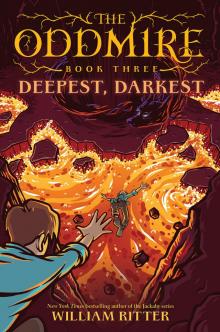 Deepest, Darkest
Deepest, Darkest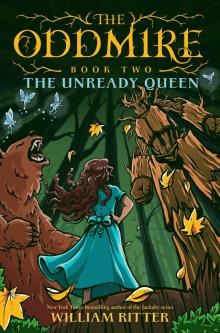 The Unready Queen
The Unready Queen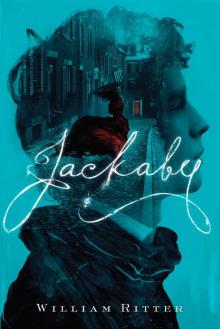 Jackaby
Jackaby Changeling
Changeling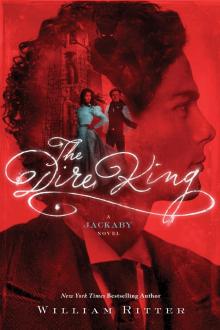 The Dire King
The Dire King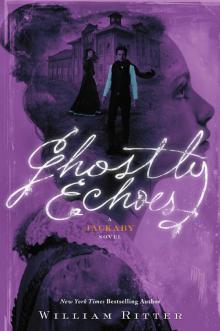 Ghostly Echoes
Ghostly Echoes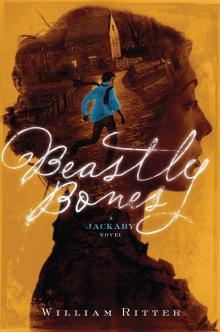 Beastly Bones
Beastly Bones